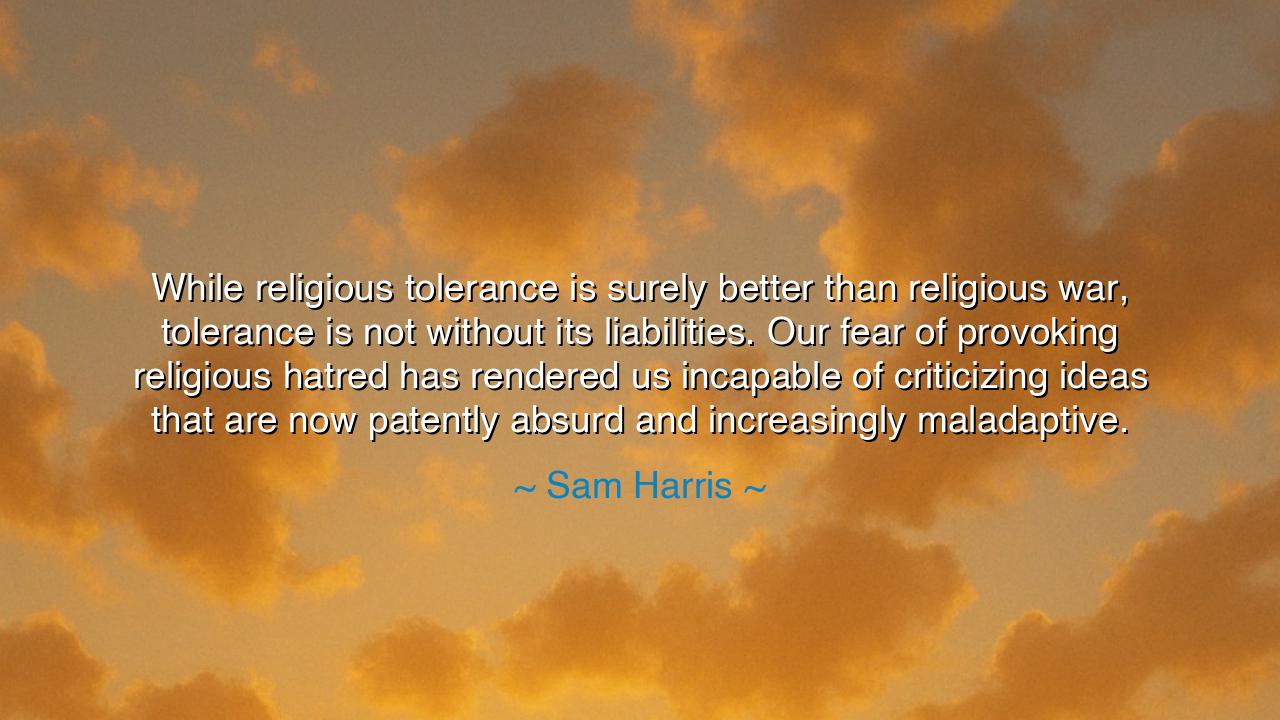
While religious tolerance is surely better than religious war
While religious tolerance is surely better than religious war, tolerance is not without its liabilities. Our fear of provoking religious hatred has rendered us incapable of criticizing ideas that are now patently absurd and increasingly maladaptive.






The philosopher and critic of dogma, Sam Harris, spoke with unflinching candor when he declared: “While religious tolerance is surely better than religious war, tolerance is not without its liabilities. Our fear of provoking religious hatred has rendered us incapable of criticizing ideas that are now patently absurd and increasingly maladaptive.” In these words lies both a tribute to peace and a warning against silence. For while it is noble to restrain the hand from violence, it is dangerous to restrain the tongue from truth.
The origin of this teaching lies in the modern world, where centuries of conflict between faiths have driven men and women to prize tolerance above all else. Better, surely, that religions coexist without bloodshed than to repeat the wars of Europe, where Catholics and Protestants burned one another’s towns, or the Crusades, where Christians and Muslims clashed across continents. Yet Harris warns that in our eagerness to avoid the horrors of war, we have allowed another peril to grow: the refusal to question beliefs that bind societies to superstition, division, or even cruelty.
History shows how silence can chain progress. In the Middle Ages, to criticize the doctrines of the Church was to risk the fire of the Inquisition. Men like Galileo, who dared to suggest that the earth moved around the sun, were silenced. The pursuit of truth was stifled by fear of offending religious authority. Only when voices rose, bold and unyielding, did science break free and bring light to the world. Harris’s words are born of this same lineage: when fear of offense becomes stronger than the love of truth, humanity suffers.
Nor is this confined to ancient times. In our own age, societies have faced acts of violence against those who dared to satirize or criticize religion. The attack upon Charlie Hebdo in Paris revealed how deeply fear has entered our discourse. Writers, artists, and thinkers hesitate to speak, not because their words lack merit, but because they dread the hatred that may follow. Thus tolerance, which should be a bridge to peace, becomes a muzzle upon the voice of reason.
Yet Harris does not call for hatred; he calls for courage. To criticize ideas is not to despise the people who hold them. One may honor the dignity of human beings while refusing to sanctify beliefs that cause harm or hinder growth. Just as doctors must tell a patient when his medicine is poison, so too must societies be willing to say when ancient doctrines no longer serve life but instead endanger it. To remain silent out of fear is to watch the poison spread.
The deeper meaning, then, is this: true tolerance must be paired with truth. To live in harmony does not mean to blind ourselves to falsehood. Rather, it means to engage in honest speech, guided not by malice but by compassion for the future of all. Criticism is not cruelty if it seeks to free minds from chains; silence is not kindness if it allows those chains to tighten.
For us, the lesson is practical and urgent. In our homes, our communities, and our nations, let us practice both peace and courage. Speak with respect, but do not fear to question. Honor the humanity of your neighbor, but do not allow harmful ideas to pass unchallenged. Teach your children that kindness is not weakness, and that truth spoken with care is a greater act of love than silence born of fear. In this way, we may preserve the blessing of tolerance without surrendering the light of reason.






TNDo Thi Thu Nga
Harris seems to be warning us about the dangers of too much tolerance, where fear of provoking religious conflict prevents us from addressing problematic ideas. It’s an important issue because some religious beliefs have the potential to hold back social and scientific progress. How do we criticize ideas without falling into the trap of being dismissive or disrespectful of people’s deeply held beliefs?
NNNhu Nguyen
I agree with Harris that tolerance is important, but it’s concerning that it might sometimes prevent us from critically engaging with certain religious ideas. While avoiding religious conflict is vital, it’s also crucial to ask whether certain beliefs are genuinely beneficial or if they hinder social progress. How do we encourage healthy debates and discussions without resorting to intolerance or creating divisions in society?
HH13. Huu Hoang
This quote challenges the current trend of over-tolerance, suggesting that it prevents us from critically analyzing certain ideas that may be outdated or harmful. I wonder if, in trying to avoid religious wars, we’ve gone too far in the other direction and allowed irrational ideas to go unchecked. Can we really have a productive conversation about religion and its role in society if we can’t discuss its flaws openly?
AGAnh Gia
Harris' argument that religious tolerance can sometimes hinder progress is thought-provoking. While I understand the need for open dialogue and avoiding religious conflict, it feels like we might be sacrificing necessary criticism for the sake of maintaining peace. Are we too scared of stepping on toes when we should be questioning ideas that no longer serve us? Where do we draw the line between respecting others and questioning outdated beliefs?
KLDuong Thi Khanh Linh
Sam Harris brings up an interesting dilemma about the consequences of religious tolerance. It’s true that certain ideas, if left unchallenged, can hold societies back from progress. But how do we find the right balance? How can we criticize harmful beliefs without encouraging intolerance or hatred? Can we truly embrace tolerance without accepting things that are fundamentally wrong or harmful?